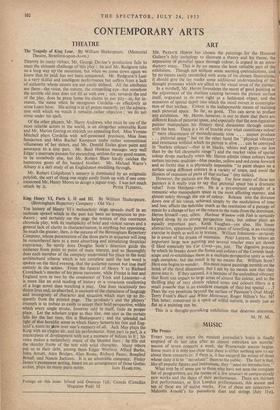King Henry VI, Parts I, II and III. By William
Shakespeare. (Birmingham Repertory Company : Old Vic.) THE history of Henry VI's melancholy feign spreads itself in an inchoate sprawl which in the past has been no temptation to pro- ducers ; and certainly on the page the texture of this enormous chronicle play, with its multiplicity of brief and violent scenes and a general lack of clarity in characterisation, is anything but appetising. So much the greater, then, is the success of the Birmingham Repertory Company, whose presentation of the three parts in sequence will long be remembered here as a most absorbing and stimulating theatrical experience. So surely does Douglas Seale's direction guide the audience from point to point of main interest, and so thoroughly does each member of the company understand his place in the total architectural scheme which is not complete until the last word is spoken on the third evening, that the audience cannot but lose itself entirely in the action. From the funeral of Henry V to Richard Crookback's murder of his pious successor, while France is lost and England torn in two by the condottieri of York and Lancaster—it is more like an avid reading of history or a voracious swallowing of a huge novel than watching a play. One lives vicariously two dozen lives and, so absorbed, is unaware of the clumsiness of language and incongruity of character and situation which start up so fre- quently from the printed page. The producer's and the players' triumph is to induce us easily to accept their bold perspective, within which every single stroke, however odd in itself, finds its proper place. Let the scholars argue as they like, one says as the curtain falls for, the last time, this is Shakespeare ; and the splendid sad light of that heraldic scene in which Henry laments his fate and Eng- land's, Casts its glow over one's memory of all. Jack May plays the King with an elegiac air, and his performance, from part to part, is a masterpiece of development with not a moment of tedium in it ; his voice makes a melancholy music of the blunted lines ; he fills out the sketchy, frame of the text with solid character. Many others put us in their debt, among them Edgar Wreford, Alfred Burke, John Arnatt, Alan Bridges, Alan Rowe, Richard Pasco, Rosalind Boxall, and Nancie Jackson. It is an admirable company. Finlay James's permanent setting, based on an arrangement of three Gothic arches, plays its many parts nobly. IAIN HAMILTON.


























 Previous page
Previous page